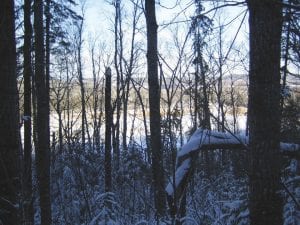Ronald Carlson of Hovland, a retired forester and McFarland Lake cabin owner, is getting tired of the bureaucratic delays regarding the construction of a 2.2-mile snowmobile trail between McFarland and South Fowl lakes. When Carlson heard that the four environmental groups opposed to construction of the trail, which would replace one closed by the U.S. Forest Service in 2003, had requested—and been granted—the right to amend their 2006 complaint against the Forest Service, he said he wondered if the legal wrangling would ever end. “By the time we get this trail, I’ll be dead,” said Carlson.
Carlson is a board member of the Arrowhead Coalition for Multiple Use (ACMU), which along with Ely-based Conservationists with Common Sense (CWCS), and Cook County, is an intervenor in the lawsuit launched against the U.S. Forest Service by the Izaak Walton League of America, Inc., Wilderness Watch of Missoula, Montana, Sierra Club Northstar Chapter and Northeastern Minnesotans for Wilderness.
Carlson is especially frustrated, he said, because the trail should have been rerouted long ago. He notes that the trail closed in 2003 predates the creation of the Boundary Waters Canoe Area Wilderness (BWCAW) and follows a logging road built by Grand Marais logger Verl Tilbury. The trail, according to U.S. Forest Service documents, is visible outside the BWCA in 1970. When the Boundary Waters Act of 1978 was passed, the wilderness boundaries were changed and the trail was inadvertently included in the wilderness. No closure signs were posted though, until 2003.
Carlson said if the trail had been rerouted in 1978, in accordance with the Boundary Waters Act, none of the seemingly never-ending environmental studies and legal issues would be taking place now.
Nancy McReady of CWCS agrees. McReady said that the BWCA legislation clearly states that the trail should have been completed in 1978 per the 1978 Boundary Waters Act, Sec. 18 (a). Expansion of Recreation Programs: The U.S. Forest Service is directed by the legislature to develop snowmobile trails to “to provide motorized recreation experiences similar to those previously available in the Boundary Waters Canoe Area.”
The groups opposing construction of the trail also cite the Boundary Waters Act, stating that Section 4(b) of the Wilderness Act “does not permit a federal agency responsible for protecting the wilderness character of an area to ignore its wilderness preservation duties when authorizing activities just beyond the border of the area. Impacts to wilderness are not classified according to the location of the authorized activity.”
Rather, Izaak Walton League of America and other plaintiffs state that the Forest Service has a “duty to preserve the wilderness [that] is wholly independent of the source or location of that activity.”
The groups argue that Forest Service Superior National Forest Gunflint District Ranger Dennis Neitzke did not properly consider the impacts of his February 2006 decision to build “Alternative 2, North Route” with the caveat that if the trail was misused it would be closed and a different route would be constructed, “Alternative 4,” a longer, but less scenic and safe trail option. In the August 30, 2013 complaint amendment, the Izaak Walton League and other plaintiffs assert that the public was not given adequate opportunity to comment on this “hybrid” or “adaptive management” proposal.
The Cook County Board of Commissioners has lent its support to the Forest Service’s attempt to construct a trail that closely resembles the former “Tilbury Trail,” with several motions and financially by hiring David Oberstar of Fryberger, Buchanan, Smith & Frederick of Duluth.
On September 17, 2013, the commissioners voted unanimously to continue to pursue the case, along with CWCS and ACMU by sharing half the cost of the next step of litigation. They passed a motion authorizing an expenditure of up to $20,000 to Attorney Oberstar. The county had previously split court costs with ACMU and CWCS.
County Attorney Tim Scannell indicated that many community members feel strongly about this issue and would want the county to move forward.
Commissioner Sue Hakes said she thought the county had spent $20,000 on legal costs so far and would approve spending that amount again. Numerous parties on both sides of this issue have spent a great deal of money for a portion of trail that is really not very long. The money spent on it could have been put to far greater use to protect the environment, she said.
The reason so much money has been placed on this matter is because decisions like this often have greater ramifications, County Attorney Scannell said.
On October 22, 2013, Commissioner Sue Hakes told her colleagues that she will be working with Assistant County Attorney Molly Hicken and representatives of the ACMU and CWCS to prepare for a meeting with Attorney David Oberstar on the ongoing litigation over South Fowl. Hakes said Attorney David Oberstar charges $250/hour.
ACMU and CWCS have each pledged $5,000 toward the cost of litigation. Commissioner Hakes said the ruling is going to set precedent, and that’s probably why the issue has gone on for so long.
Reached in his Duluth office on October 23, Attorney Oberstar said the government has until November 15 to answer the amended complaint. Oberstar said he had filed an answer for his clients, Cook County, CWCS and ACMU. He said he expected the matter to go to summary judgment hearing sometime after the end of the year. Oberstar said his arguments would not be very different than they have been all along. “It’s just a small snowmobile trail,” he said.
“They are trying to take the wilderness concept too far,” Oberstar said. “They don’t want the sound to travel into the BWCAW— but it’s perfectly legal to ride a snowmobile outside the wilderness.”



Loading Comments